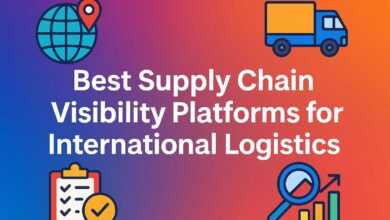How AI Agents Are Revolutionizing Enterprise Workflows

AI agents have evolved beyond being tools. They are becoming the new backbone of enterprise operations. For years, brands have been reliant on automation to help them through routine workstreams, but that only begins to scratch the surface. In the current time, the evolution of AI agents in enterprise workflows is reshaping how companies run, moving from static to dynamic systems, intelligent assistants that learn, adapt, and act uninterupttedly.
Imagine workflows that are self-driven, as they do not need human input to start. AI agents process data in advance, anticipate problems, and even take action in real-time. Not only do they assist in acceleration, but they also advance the processes, creating efficiency, driving down costs, and enabling the agile strategic approach. Where speed and accuracy mean existence, AI agents are not a luxury anymore but a requirement for future-proof enterprises.
AI Agents vs Traditional Automation: Who is the Winner
AI agents are referred to as autonomous entities built to accomplish complex operations. It is done by making the right decisions, learning from data, and interacting with multiple systems with minimal human intervention. Unlike traditional automation, where robust rules are statically defined, AI agents adapt themselves dynamically, plan multi-level workflows, and incrementally improve after the learning period desired to optimize their performance, with advanced technology options like machine learning, natural language processing, and predictive analytics. Subsequently, these AI agents further efficiency and innovation across several enterprise systems.
Traditional automation vs AI agent: The key differences
- Autonomy: The AI agent operates autonomously and reacts to situations, while traditional automation requires a finite set of rules or instructions.
- Ability of Learning: The AI agent learns from data and grows through experience, whereas traditional automation simply executes the task and does not become better at performing.
- Flexibility: The AI agent manages unstructured, complex, multi-step tasks, while traditional automations manage simple, repetitive, structured situations.
- Ability to make decisions: AI agents make decisions based in a context that includes real-time analysis; traditional automation decisions are static and have predefined rules.
- Integration Scope: It is clear that AI agents work across many systems and workflows; traditional automation likely stays within single processes.
- Error Handling: An AI agent can go and self-correct and self-adapt; common automation stands with its manual intervention to solve errors.
While traditional automation still can be useful on simple, repetitive processes, AI agents truly dominate enterprise workflow evolution. Going further than traditional automation with intelligence, adaptability, and learning capability enables organizations to innovate, scale efficiently, and dynamically respond to changing business needs. Hence, AI agents are the future of intelligent automation in the enterprise.
Key Capabilities of AI Agents in Enterprises
AI Agents in Enterprise are changing the blueprint with which businesses plan, cooperate, and operate by delivering sustained intelligence, autonomy, and contextual awareness across workflows in organizations. Unlike traditional automation, solutions rendered by AI Software Development Services empower AI agents to execute tasks dynamically, improve decision-making, and interconnect fragmented systems using machine learning and advanced analytics. Data analysis, engaging in humanlike dialogue or conversation, and executing multi-step actions will allow them to be positioned at the center of operations to be set for the imminent future. They are quickly becoming the back-end engines of enterprise innovation, generating extraordinary efficiencies and improving organizational response rates when compared to traditional methods.
1. Autonomous Task Execution
AI Agents in Enterprise autonomously execute complex, multiple-step tasks ranging from regular operations to cross-functional projects on the fly, without constant human supervision. These agents are active decision-makers; they process requests and yield results, thus granting business operations 24/7 agility and reliability.
2. Contextual Reasoning and Learning:
Unlike typical AI reasoning in stand-alone operation, AI agents in enterprises are built around sophisticated machine learning models, including NLP ones that help refine unreasonable actions. It uses most of the data to understand the context and learning its own actions over time. These are suggestive of workflows and business cases that change or shift to new scenarios, correcting themselves, resulting in continuous process improvement and fewer mistakes.
3. Predictive Analytics and Optimization:
These agents will mine enormous streams of enterprise data in real time, providing trend forecasts, chain optimization, and predicting consumer demand. Through AI Agents in Enterprise, managers will make quicker and better-informed decisions, managing resources proactively using predictive analytics.
4. Seamless Integration from Multi-Systems:
In this role, the AI Agents in Enterprise integrations will stack data, creating silos across ERP, CRM, and others. Processes synchronize across departments when this occurs, forming unified information management, seamless collaboration, and fast process automation-the entire enterprise ecosystem.
5. Human Coordination and Workforce Augmentation:
Rather than replacing people, incremental add-ons partner with teams, automating the repetitive tasks with those agents offer, generating meaningful recommendations, and freeing employee time for more valuable duties. Digital assistants increase productivity, fuel innovation inside the enterprise, and enhance strategic focus.
6. Improved Security and Compliance:
Enterprise-grade security policies and regulatory compliance can be automated with audit trails, data protection, and management of sensitive information by an enterprise-hardened AI Agent. Monitoring and flagging risks will make an organization more resilient.
7. No-code/Low-code Flexibility:
Today’s AI Software Development Services deliver AI agents on no-code and low-code platforms that allow enterprises to deploy and personalize agents swiftly for a variety of business needs, without specialized AI engineers.
Critical Use Cases of AI Agents in Enterprise Workflows
With AI agents, enterprises can innovate extremely multifaceted processes, from complex decision-making to ensuring operational efficiency in the different functions of an organization. They keep on breaking new ground in finance, human resources, and supply chain management seamlessly and without precedent.
1. Finance and Accounting
Fraud detection and invoicing are automated with AI agents for error-free and risk-free transactions. The following are the main ones:
- Continual transaction monitoring for instant identification of any suspicious activity
- Payment processing via automated invoice verification drives workflow acceleration
- Reduced manual errors and prevented financial fraud through real-time data analysis
- Clear compliance and audit-readiness records
2. Human Resources
AI agents for use in human resources will thus tweak recruitment of talent and employee engagement through intelligent automation:
- Automation of resume screening and AI-based candidate short-listing
- Personalization of candidate matching based on historical inside data and job requirements
- Real-time employee engagement-tracking and personalized communication
- Remove most repetitive processes from the HR teams so that they can focus on strategic initiatives
3. Supply Chain and Logistics
AI agents will improve demand forecasting and logistics efficiency, thereby increasing agility and savings:
- Sound demand prediction by making use of historical data paired with market trends
- Dynamic routing considering traffic, the weather, and fuel efficiency
- Consider inventory management to cut down on stockouts and overstock situations
- The company will become more responsive and resilient as real-time adjustments continue.
The best AI Agent Development Companies are headlining these scalable, intelligent AI solutions specifically tailored for enterprise-grade workflows.
Benefits of an AI Agent in Enterprise Transformation
AI in the enterprise is a transformative agent propelling increased operational excellence and strategic growth. The heightened potential of the agent brings intelligence, speed, and cost-effectiveness to the business.
1. Increased Efficiency and Productivity
AI agents are implemented in corporate departments to automate tedious tasks that take up so much time of employees, therefore increasing capacity. Speeding workflows and decreasing human errors bolsters productivity by diverting workers’ time to higher-value work.
AI agents are monitoring activity in real-time, compliance violations, and identifying possible internal risks for the organization. An anomaly is immediately detected and accompanied by automated trail audits that help protect from regulatory compliance and operational vulnerabilities.
2. Flexibility Enhanced Scalability
Learning and adaptive AI agents enable organizations to respond quickly and easily to market changes while scaling business operations.
AI agents can, in real time, monitor activities and violations in compliance. They may also expose a business to internal threats. Anomalies are detected instantly, and automatic audit trails prevent regulatory non-compliance and operational gaps.
3. Enhanced flexibility and scalability
AI agents are adaptive and learning, which enables them to respond quickly to changing market conditions and scale business operations up or down effortlessly.
This fact underscores the need for AI agents in enterprises as they will be the key catalysts of digital transformation and ensure competitive superiority.
AI Agents in Enterprise Workflows: Challenges and Limitations
Most importantly, the enterprise is bright in its pursuit of AI agents, but some problems need to be tackled for its success.
- Integration problems: Trying to integrate AI agents into a legacy environment can sometimes be very difficult. Additional middleware and specific APIs need to be written for everything to work correctly.
- Data Quality: AI agents require clean, relevant, and high-quality data to function properly. Poor-quality data results in poor levels of accuracy in making decisions.
- Consistency and Reliability: AI agents are adaptive and generative, which often results in unpredictable behavior; thus, it is difficult to validate the conditions of their decisions within critical workflows.
- Cost and Scalability: The high expenses incurred in scaling AI agent deployments and harnessing the needed computational resources are, therefore, problematic for enterprises.
- Security and Compliance: Continuous monitoring is done to detect data breaches and unethical use of AI systems.
Future Outlook: The Next Era of AI Agents in Enterprises
These are powerful trends that currently alter the face of businesses for the future of AI agents in enterprise. Business transformations and innovations have very powerful promises of further enhancement in automation, collaboration, and access to organizations.
1. Hyperautomation
AI agents in enterprise drive hyperautomation, wherein a very complex workflow is managed independently, and operations are executed without human involvement. Continuous business acceleration and reduction of manual bottlenecks made possible by process efficiency improvements introduce hyperautomation.
2. AI-Augmented Workforce
The workforce in enterprises continues to accept AI agents that work with them by automating mundane tasks and giving time to employees to work on strategic and creative tasks. AI agents could serve as digital companions in making decisions more productive and better through real-time insights.
3. No-Code/Low-Code Platforms
AI Agent Development Services are on track to make the most out of no-code/low-code platforms to really ease building and customizing AI agents. This democratizes AI, which allows non-technical users a much easier way of building and managing their own AI workflows within an organization, speeding up enterprise adoption and scalability.
Conclusion
AI agents in enterprises have changed how an enterprise operates, from static automation as we had in the past to the dynamic, intelligent systems that actually learn in real time and adapt. Such agents can manage complicated workflows and operate naturally, but with several systems, thus improving themselves and making them indispensable to the modern enterprise. They reflect a technological upgrade but, from the company’s viewpoint, a strategic imperative. Such capabilities will be vital for staying competitive and future-proofing operations as society evolves within an increasingly digital landscape.



